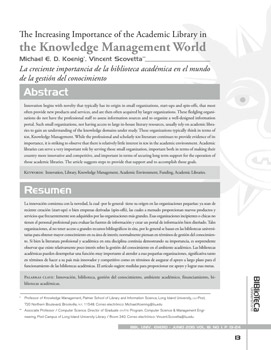The Increasing Importance of the Academic Library in the Knowledge Management World
DOI:
https://doi.org/10.22201/dgb.0187750xp.2015.1.83Palabras clave:
Innovación, biblioteca, gestión del conocimiento, ambiente académico, financiamiento, bi- bliotecas académicas.Resumen
Innovation begins with novelty that typically has its origin in small organizations, start-ups and spin-offs, that most often provide new products and services, and are then often acquired by larger organizations. These fledgling organi- zations do not have the professional staff to assess information sources and to organize a well-designed information portal. Such small organizations, not having access to large in-house literary resources, usually rely on academic libra- ries to gain an understanding of the knowledge domains under study. These organizations typically think in terms of km, Knowledge Management. While the professional and scholarly km literature continues to provide evidence of its importance, it is striking to observe that there is relatively little interest in km in the academic environment. Academic libraries can serve a very important role by serving those small organization, important both in terms of making their country more innovative and competitive, and important in terms of securing long term support for the operation of those academic libraries. The article suggests steps to provide that support and to accomplish those goals.
Descargas
Citas
Alavi, Maryam, Kayworth, Timothy R., & Leidner, Do- rothy E. An Empirical Examination of the Influence of Organizational Culture on Knowledge Manage- ment Practices. Journal of Management Information Systems, 2005, vol. 22, no. 3, p. 191-224.
Alavi, Maryam, Leidner, Dorothy E. Review: Knowled- ge Management and Knowledge Management Sys- tems: Conceptual Foundations and Research Issues. mis Quarterly, 2001, vol. 25, no. 1, p. 107-136.
Anantatmula, Vittal S. Linking km Effectiveness Attri- butes to Organizational Performance. vine, 2007, vol. 37, no. 2, p. 133-149.
Applegate, Lynda M., Elam, Joyce J. New Information Systems Leaders: A Changing Role in a Changing World. mis Quarterly, 1992, vol 16, no. 4, p. 469-490.
Burns, Paul. Entrepreneurship and Small Business. 2nd ed. Basingstoke, England ; New York: Palgrave, 2007. 538 p.
Chen, Irene Y. L. Social Capital, It Capability, and the Suc- cess of Knowledge Management Systems. Knowledge Management & E-Learning: An International Journal (km&el), 2009, vol. 1, no. 1, p. 36-50.
Dalkir, Kimiz. Knowledge Management in Theory and Practice. 2nd ed. Cambridge, Mass.: mit, 2011. 485 p.
Davenport, Thomas H., De Long, David W., Beers, Mi- chael C. Successful Knowledge Management Projects. Sloan Management Review, 1998, vol. 39, no. 2, p. 43-57.
Davenport, Thomas H., Prusak, Laurance. Working Knowledge: How Organizations Manage What They Know. Boston, Mass: Harvard Business School, 1998. 199 p.
Delone, William H., Mclean, Ephraim R. Information Systems Success: The Quest for the Dependent Variable. Information Systems Research, 1992, vol. 3, no. 1, p. 60-95.
Fowler, Rena K. The University Library as Learning Or- ganization for Innovation: An Exploratory Study. College & Research Libraries, 1998, vol. 59, no. 3, p. 220-231.
Gibbs, Wayt W. Public Not Welcome. Scientific American, 2003, vol. 289, no. 3, p. 24-26.
Huber, George P. Organizational Learning the Con- tributing Processes and the Literatures. Organization Science, 1991, vol. 2, no. 1, p. 88-115.
Jayasingam, Sharmila, Ansari, Mahfooz A., Jantan, Muhamad. Influencing Knowledge Workers: The Power of Top Management. Industrial Management & Data Systems, 2010, vol. 110, no. 1, p. 134-151.
Jennex, Murray E. Exploring System Use as a Mea- sure of Knowledge Management Success. Journal of Organizational and End User Computing, 2008, vol. 20, no. 1, p. 50-63.
Jennex, Murray E., Olfman, Lorne. Organizational Memory/Knowledge Effects on Productivity, a Lon- gitudinal Study. En: Annual Hawaii International Conference on System Sciences (35 : 2002 : Hawaii). Proceedings of the 35th Annual Hawaii International Conference on System Sciences, 7-10 January 2002. Big Island, Hawaii. Edited by Ralph H. Sprague. Los Ala- mitos, California: ieee, 2002, p. 1029-1038.
Jennex, Murray E., Olfman, Lorne., Panthawi, Pituma, Park, Yong-Tae Park. An Organizational Memory Infor- mation Systems Success Model: An Extension of Delone and Mclean’s I/S Success Model. En: Annual Hawaii In- ternational Conference on System Sciences (31 : 1998 : Hawaii). Proceedings of the 31th Annual Hawaii International Conference on System Sciences, 6-9 January 1998. Los Alami- tos, California: ieee, 1998,volume 1, p. 157-165.

Descargas
Publicado
Cómo citar
Número
Sección
Licencia
Descargar el formato de Cesión de derechos en formato PDF:
Formato de Cesión de derechos
Imprímalo y una vez que lo haya firmado envíenoslo vía fax o por correo a:
Revista Biblioteca Universitaria:
Dirección General de Bibliotecas y Servicios Digitales de Información de la UNAM
Departamento de Publicaciones
Edificio de la Biblioteca Central, 11o Piso,
Circuito Interior, Ciudad Universitaria, 04510 México, D.F.
Tel 5622-1616,
Fax: 5622-1601,






